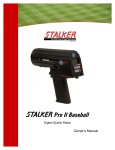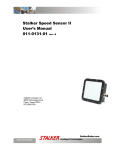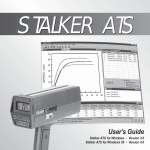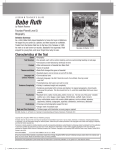Download 011-0008-00 K-Sport Operators Manual.PMD
Transcript
STALKER Sport Digital Sports Radar Digit al Sport sR adar Owner’s Manual Not intended for Law Enforcement use. Table of Contents STALKER Sport Owner’s Manual Table of Contents Introduction Quick Start Instructions What Should Be Included Controls and Indicators Detailed Instructions 6.1 6.2 6.3 7.1 7.2 8.1 8.2 8.3 8.4 Page 1 Page 2 Page 3 Page 4 Page 5 Pages 6 - 8 Providing Power to the Stalker Turning the Transmitter ON and OFF Using the Trigger to Lock Speeds Testing the Stalker The Peak Hold Function The Setup Menu Confirming and Changing the Setup Menu The Range (Sensitivity) Setting The Recall Speed Feature Factory Preset Options Battery Information Angle Error Interference Problems Recommended Settings Available Accessories Service Information Specifications STALKER RADAR 2609 Technology Drive Plano, TX 75074 1-888-STALKER (972) 398-3760 Sales (972) 398-3781 Fax www.stalkerradar.com 1 Page 9 Page 10 Page 11 Page 12 Page 13 Page 14 Page 15 Page 16 Introduction Congratulations! You have purchased the finest sports radar system available. The Stalker Sport K band sports radar is designed to measure the speed of a wide variety of objects; such as baseballs, watercraft, cars, snowmobiles, and just about anything that moves. The Stalker Sport radar sends out very high frequency radio waves and measures the change in the frequency after it bounces off a moving object. This is commonly referred to as “Doppler Radar.” This invisible radio wave is extremely low power (about 1/200th of a watt) and is completely safe for close and continuous operation. The Stalker Sport is a true “digital” radar system. The Stalker converts the reflected microwave signals into a digital stream of data. The guns own computer then processes this data stream using sophisticated programming, to interpret, filter, and measure the speeds. This technology is closely related to the compact digital disc, and modern personal computers. This type of radar system has the potential to provide substantially superior performance and accuracy over conventional radar systems. While the technology in the Stalker Sport is extremely advanced, it’s operation is quite simple. Reading through this manual will help you to take full advantage of the many features and capabilities of the Stalker Sport radar. Have Fun! 2 Quick Start Instructions The Stalker Sport has several features that allow the gun to work well in a wide variety of applications. With some basic understanding, the gun is very simple to operate. Basic Operation 1. Slide the handle onto the bottom of the gun. The cordless version is powered by a battery that is built into the handle. If you have a corded handle, plug the cigar plug into the cigar socket on the portable battery pack. Power 2. Turn the gun ON by pressing the green Power button. 3. Squeeze the trigger to begin operating (transmitting). f Important Settings There are three buttons that control how the radar gun functions. Setup Menu - This feature “fine tunes” the radar to look for specific types of Setup Menu targets, and certain speed ranges. For example; b50 is for clocking balls above 50 mph. A sticker on the bottom of the gun body gives details to each menu setting. Page 8 in this manual provides the full explanation for the setup menu. Range - This controls the sensitivity of the radar. Hi is the normal setting for Range maximum sensitivity and clocking distance. Lo is used to limit the clocking distance when interference may be a problem. Peak Hold - With the Peak Hold mode ON, the gun will only show the peak speed Peak Hold (this is the RELEASE SPEED when clocking a baseball pitch). With the Peak Hold OFF, the gun will continuously show the speeds as they change, updating about 25 times per second. Turning the Transmitter ON and OFF There are two ways to turn on the radar transmitter to begin operating. Trigger Transmit - Squeeze and hold the trigger to transmit. f Release the trigger to stop transmitting. X-Mit The X-mit / Hold Button - Press the red X-mit / Hold button to toggle the Hold transmitter ON or OFF. POWER PEAK HOLD * The XMIT icon will be displayed when the gun IS transmitting. * The HOLD icon will be displayed XMIT when the gun IS NOT transmitting. HOLD MPH . 3 What Should Be Included What Should You Have Received With Your Stalker? The components that you should have received with your radar depends upon the package that you purchased. If you are missing any parts or if you would like to upgrade your package, contact Stalker Radar at 1-888-782-5537. CORDED BASE PACKAGE - Radar Gun Body - Tuning Fork - Corded Handle (With Lighter Plug) - Corrugated (Cardboard) Storage Case DISPLAY BOARD PACKAGE - Radar Gun Body - Tuning Fork - Display Handle with Detachable Cord - Corrugated (Cardboard) Storage Case CORDLESS BASE PACKAGE - Radar Gun Body - Charging Platform - Tuning Fork - Ni-Cad Battery Handle (Standard Battery) - AC Platform Transformer - Corrugated (Cardboard) Storage Case PREMIUM PACKAGE - Radar Gun Body - Charging Platform - Tuning Fork - Ni-MH Battery Handle (2X Capacity) - AC Platform Transformer - Deluxe Lockable Hard Carrying Case Corded Base Package Premium Package 4 Controls and Indicators POWER TEST ERROR LOCKED PEAK HOLD LOW VOLT XMIT KPH HOLD MPH 8 8 8. 8 LCD DISPLAY ICONS POWER - Indicates the gun is on TEST - Activated during the diagnostic / calibration self test ERROR - Indicates the self test found calibration or operational problems LOCKED - Indicates the readings have been locked by the trigger PEAK HOLD - Indicates that the Peak Mode is on and the peak speeds will be held LOW VOLT - Indicates the battery or voltage is low XMIT - Indicates the gun is transmitting and is able to take readings HOLD - Indicates the transmitter is off and no new readings can be taken KPH - Displayed speeds will be in Kilometers per Hour MPH - Displayed speeds will be in Miles per Hour KEYPAD BUTTONS Power - turns the gun’s power on or off Self Test - performs a self-diagnostic and calibration test. It will check the guns calibration against a built in crystal. 80.0 mph indicates proper calibration. X-Mit / Hold - this button is similar to the trigger. It toggles the transmitter ON or OFF. Recall Speed - redisplays the most recent speed reading Setup Menu - selects the operational program settings Range - selects the sensitivity level (high or low) Peak Hold - turns the Peak Mode on and off. With Peak Mode ON, only the peak speeds are displayed. With the Peak Mode OFF, the current speeds are continuously updated. 5 Detailed Instructions Providing Power to the Stalker There are several different handles available for the Stalker. The Battery Handle - The battery handle has a ni-cad battery built into the handle. When fully charged, the battery handle will power the gun for about 3 hours of continuous transmitting, or up to 20 hours of normal trigger operation. Use the included Smart Charging platform to recharge the battery handle. The Corded Handle - The cigar plug on the bottom of the corded handle can plug into an automotive cigarette lighter, or into a 12 volt DC battery pack. The Display Handle - The display handle is used when connected to an external speed display readout board. The Stalker display boards are designed to power the radar gun through the communication cable that connects into the bottom of the display handle. Turning the Transmitter ON and OFF The radar transmitter must be turned ON in order to make any speed measurements. There are TWO ways to make the Stalker transmit. Trigger Transmit - Squeeze and hold the trigger in to transmit. When the f trigger is released, it will stop transmitting, and any readings that were on the readout will be left on the screen. Since the transmitter draws most of the power, trigger operating will help to save battery life. X-Mit Press the X-mit / Hold Button - The red X-mit / Hold button toggles the Hold transmitter ON and OFF. Each time you push this button it will switch between transmit and hold. Using this button to turn on the transmitter allows the gun to continually operate automatically, without the need to depress the trigger. POWER PEAK HOLD * The XMIT icon will be displayed when the gun IS transmitting. * The HOLD icon will be displayed XMIT when the gun IS NOT transmitting. HOLD MPH . Using the Trigger to Lock Speeds The trigger serves two functions. It can control the transmitter or be used as a speed locking device. When the gun is placed into continuous transmit mode using the red X-mit / Hold button, the trigger does not effect POWER LOCKED the transmitter. Instead, squeezing the trigger will lock the current displayed speed while XMIT displaying the LOCKED icon. Squeezing the MPH trigger a second time will unlock the readout. This function is useful if the operator wishes to manually hold readings. I 2 4. 8 6 Testing the Stalker There are two ways to test the accuracy and operation of your Stalker. The Self Test button test’s the calibration precisely while the tuning fork verifies actual operation. Self Test Button - Pressing the Self Self POWER TEST Test Test button will initiate a self diagnostic check. The gun will test several key components XMIT and check it’s calibration against a built-in MPH crystal. If the display shows 80.0 mph, it is calibrated correctly. If the self test finds any problems, or if it fails the calibration test, the ERROR icon will appear. This test does not verify the receiver components. Tuning Fork Test - The tuning fork that was included with the Stalker is designed to ring at a specific frequency that is equivalent to the K band Doppler frequency at a certain speed. Strike the fork against a solid, non-metallic object so it audibly rings. Place the fork about two inches in front of the radar. The thin side of the fork should be closest to the gun. Then squeeze the trigger to take a reading. The gun should display the speed that the fork is stamped. 8 0. 0 The fork may produce a peak reading higher than the stamped speed, due to some distortion, so turn off the Peak Hold first. The speed will fluctuate several tenths, and the temperature of the fork will effect it’s accuracy substantially. Make sure that the Setup Menu setting does not have a low speed cutoff that is higher than the tuning fork speed. For example, if the menu is set at b50, it will not read speeds below 50 mph so a fork speed of 40 mph would be too low to register. Also note that only the vehicle type setup menu settings will display the 1/10th digit. The Peak Hold Function The Peak Hold button activates the automatic top speed lock. When the Peak Hold mode is on, the PEAK HOLD icon will appear on the display. Only the highest speeds will be displayed. When tracking a baseball pitch, the peak speed will be the same as the release speed since a ball only slows down after it is thrown. When the PEAK HOLD icon is OFF, the gun will continuously display speeds as they change. When tracking a baseball pitch, the display would start by showing the release speed, but then rapidly roll down and hold the last speed reading at the plate. Peak Hold TIP - The Stalker keeps both the Peak and Last speeds in memory. As long as a reading is on the display (either by releasing the trigger to hold the reading, or pressing the Recall Speed button to bring it back on the display) you can switch back and forth between the last recorded speed, and the peak speed by changing the Peak Hold setting. For example: If you are clocking baseballs, and the Peak Hold is ON, after the pitch is thrown, change the Peak Hold setting to OFF to see what the speed was at the plate. 7 The Setup Menu The Stalker radar gun has several different menu settings designed to optimize the gun’s performance for specific uses. A boat and a baseball have different signal characteristics to a radar gun. By creating special programs (signal processing algorithms) for specific uses, the Stalker radar gun is able to achieve much higher levels of performance. Setup Menu The Setup Menu Options Mode a a25 b25 b50 c15 c25 d35 Application Vehicles and Boats Vehicles and Boats Baseballs (at long distances) Baseballs (at long distances) Carnival Use (balls at very close distances) Carnival Use (balls at very close distances) Tennis or Golf (balls with higher speeds) Resolution 1/10th 1/10th whole whole whole whole whole Speed Ranges 5 - 250 mph 25 - 250 mph 25 - 110 mph 50 - 110 mph 15 - 100 mph 25 - 110 mph 35 - 165 mph Confirming and Changing the Setup Menu By pressing the Setup Menu button one time, the current setting will be shown on the display. To keep this setting, you can wait for the screen to clear in a few seconds, or you can squeeze the trigger to clear POWER PEAK HOLD the screen. To change the setting, press the Setup Menu button again to begin toggling through the seven options. When you reach the desired setting, pull the trigger to accept and HOLD MPH clear the screen. The menu setting is stored by the gun, so it will always return to the last setting, even when the power is turned off. Most customers will set this menu once, and will never need to touch it again. Setup Menu C I S. The Range (Sensitivity) Setting The Range button effects the sensitivity (clocking distance) of the radar. The normal setting is HI. HI range lets the gun “look” as far away as possible for targets, and gives the gun the highest level of performance. Setting the range to LO, will decrease the gun’s sensitivity, and shorten it’s clocking distance. The LO range setting can be handy if you are clocking objects close to the gun and you want to restrict the gun from “seeing” objects farther out in the background. Range The Recall Speed Feature The Recall Speed button will redisplay the last speed readings that were measured. Both the peak speed, and the last speed are kept in memory. So even if the peak hold function was off, the peak speed for the last tracking can be recalled. After recalling a speed, you can change the Peak Hold setting to view either the Peak speed or the Last speed. 8 Recall Speed Factory Preset Options What is a Factory Preset Option? There are two settings that are intended to be set at the factory and never changed again. However, these settings can be changed by the user under certain conditions. Master Sensitivity Setting - The guns overall sensitivity setting. Display Units - The gun can be set to display in MPH or KPH units. Accessing the Preset Options Menu A specific combinations of buttons need to be pressed to access the preset menu. This is intended to make accidently changing the presets highly unlikely. 1. When the gun is on, press the Setup Menu button once. It should display the Setup Menu current setup menu option. 2. While the current setup menu option is displayed*, press the Recall Speed and the Peak Hold buttons at the same time. (*step 2 needs to be done immediately Recall Peak Speed Hold after pressing the Setup Menu button, because the menu is only displayed for about 1 1/2 seconds) 3. If you are successful at accessing the preset POWER PEAK HOLD option mode, the readout should display the master sensitivity setting (usually SEn8). To clear out of the preset option menu, squeeze and KPH release the trigger. The gun will then return HOLD to normal operation. S E K. 8 Changing the Factory Preset Options Once you have accessed the Preset Options Menu following the above steps, you can change the master sensitivity and the units settings. Warning: an incorrect master sensitivity setting will result in poor performance or ghost readings. Master Sensitivity Setting Use the Range key to toggle between these four different sensitivity levels. Range SEn6 lowest setting - only used in extremely high noise environments SEn7 lower than normal - use if the gun is giving random readings SEn8 normal setting for the Stalker Sport SEn9 highest setting - may cause random readings on many guns Display Units Setting Use the Peak Hold key to switch between MPH and KPH units. Note that the Peak Hold MPH or KPH icon will be displayed to show which units have been selected. When you have reached the desired settings, squeeze the trigger. After a few seconds, the gun will return to normal operation, and it will retain any changes that were made. 9 Battery Information Operational Time on the Battery Handle The Stalker draws the most current when it is transmitting. So, the run time depends upon how often the gun is transmitting. The Stalker also has a sleep mode to conserve battery life when it is not being operated. The sleep mode is automatically initiated after about 15 seconds of inactivity with no speed display. Squeezing the trigger immediately “wakes the gun” and brings it back to operation. Operational Status Run Time Continuous Transmitting 2-3 Hours Typical Trigger Operation 10-20 Hours In Sleep Mode 38 Hours Low Battery Warning POWER PEAK HOLD When the battery runs low, the LOW VOLT icon LOW will begin to flash. At that time, the Stalker VOLT will only operate for a very short time. When the LOW VOLT icon is continuously displayed, HOLD MPH the gun will no longer operate. DO NOT CHARGE THE BATTERY HANDLE UNTIL THE GUN FLASHES LOW VOLT. . Charging the Battery Handle After the Stalker indicates the battery handle is low, remove the handle from the gun, and slide it into the Smart Charging Platform. Plug the wall adapter into the platform and then into a 110-120 volt wall outlet. Push the Start button on the platform to begin charging. The green light indicates it is charging. After about 8 hours, the green light should shut off, and the charger will drop to a trickle charger. The handle can be left on a trickle charge without damage. If desired, the handle can be completely trickle charged by not pressing the Start button. It takes about 24 - 36 hours to trickle charge the battery handle. Ni-cad batteries perform best when they are fully discharged and then fully charged. Charging the Optional Portable Battery Pack (Corded Version) The Bescor battery pack uses lead acid cells, and it is not subject to memory problems like ni-cad batteries. So, it is not necessary to completely discharge prior to charging. However, it is very possible to OVERCHARGE the battery pack. It takes 8 - 12 hours to fully charge the battery. Never charge more than 24 hours. A good rule of thumb is to charge the battery for two hours after every one hour of use. 10 Angle Error The most common mistake made with all radar guns is trying to clock targets at angles. All radar guns work on the Doppler principle and need to clock objects moving directly at or away from the gun. Clocking at an angle with a stationary radar will result in angle error, and the gun will display a speed that is LOWER than the actual speed. Cosine Angle Error Chart True Speed 25.0 mph 50.0 mph 75.0 mph 100.0 mph 125.0 mph 150.0 mph 200.0 mph 250.0 mph 0 Degrees 0 % Error 25.0 mph 50.0 mph 75.0 mph 100.0 mph 125.0 mph 150.0 mph 200.0 mph 250.0 mph 5 Degrees 0.4 % Error 24.9 mph 49.8 mph 74.7 mph 99.6 mph 124.5 mph 149.4 mph 199.2 mph 249.0 mph 15 Degrees 3.4 % Error 24.1 mph 48.3 mph 72.4 mph 96.6 mph 120.7 mph 144.9 mph 193.2 mph 241.4 mph 10 Degrees 1.5 % Error 24.6 mph 49.2 mph 73.9 mph 98.5 mph 123.1 mph 147.7 mph 197.0 mph 246.2 mph 30 Degrees 13.4 % Error 21.7 mph 43.3 mph 65.0 mph 86.6 mph 108.3 mph 129.9 mph 173.2 mph 216.5 mph 45 Degrees 29.3 % Error 17.7 mph 35.4 mph 53.0 mph 70.7 mph 88.4 mph 106.1 mph 141.4 mph 176.8 mph 90 Degrees 100 % Error 0 mph 0 mph 0 mph 0 mph 0 mph 0 mph 0 mph 0 mph Radar Gun Placement Correct Placement Line of Travel Target Object 25 Degree Angle Incorrect Placement In order to get accurate readings, the radar gun must be placed in the line of travel of the target. At slight angles, the error will be very small, however at larger angles, the error will be substantial. Calculating Angel Errors If you know the angle that you are clocking at, you can calculate the actual speed by taking the radar reading and dividing by the cosine of the angle. For example: if you are clocking at 30 degrees, and the gun displays 129.9 mph. Take 129.9 and divide by the cosine of 30 degrees (0.866) to get a true speed of 150.0 mph. 11 Interference Problems Interference Frequencies The Stalker Sport radar transmits in the microwave frequency range (24,150,000,000 Hz), however the receiver is designed to read the Doppler frequency (the change in frequency) which is much lower (360 - 18,000 Hz). There are very few devices other than other radar guns that could cause interference in a radar gun’s transmission frequency range. Unfortunately, in the receiver’s frequency range, there are a number of devices that could interfere with radar guns. What Does Interference Do? Interference can cause a radar gun to read random readings, or it can make it harder for the radar gun to “see” the intended target. Random readings are an obvious sign that there is interference. However, a loss of sensitivity can be subtle. A common situation occurs when a large number of professional baseball scouts operate many radar guns in close proximity. A loss of sensitivity can cause the radar gun to be unable to “see” far enough away to get the ball speed right when it leaves the pitchers hand. Then only as the ball gets closer to the plate is the radar able to get a reading (after it has slowed down some). The result - the peak speed is lower than it should be. Sources of Interference There are two main types of sources that can cause ghost (random) readings in radar guns; electrical devices and objects that move or vibrate. Electrical sources include television monitors, fluorescent lights, cellular phones, computers, some radio transmitters, and power transformers. Moving or vibrating ojects like ventilation fans, motors, and blowing debris can tend to produce a somewhat constant speed reading. Ways to Eliminate Interference If you are experiencing some erroneous readings, you may be able to change your position to effect where the gun is aimed. You could also lower the sensitivity by setting the Range to LO. If the readings are low speeds (often from motors) you may be able to change the Setup Menu setting to a setting with a higher low speed cutoff. Shielded Version The advanced design of the Stalker should be able to work in very high interference environments. However, if you cannot eliminate readings in certain applications, your gun can be outfitted with a fully shielded, metal coated body housing for some extra cost. There also is the Stalker Professional line of sports radar equipment that operates on a higher, Ka band frequency. The Professional series has some additional capabilities and even superior interference rejection. 12 Recommended Settings Settings for Baseball Scouts It is important that the gun is set correctly when measuring baseballs. Check these settings. Setup Menu b50 (For balls above 50 mph) Range Hi Maximum sensitivity is needed* Peak Hold ON - This is for “out of the hand” numbers *You may want to see if your gun will operate okay with the master sensitivity setting at SEn9 (See page 9 for details) Setting for Fastball Carnival Use You can experiment with the Range setting depending upon what rides and motion is around the gun. Setup Menu C15 or C25 Range Hi (change to Lo if you track outside motion) Peak Hold ON Settings for Tennis and Golf You may need to position the radar so it does not “see” the racquet or club head during it’s swing. Setup Menu D35 Range Hi Peak Hold ON Setting for Vehicle Racing Using a low speed cutoff of 25 mph will help ignore anyone walking around, or other low speed motion. Setup Menu A25 Range Hi Peak Hold OFF - You can always check the peak speed after a pass as long as there is a reading on the display. How To Save Battery Life Since the transmitter has the highest current draw, you should put the transmitter into hold whenever you are not taking readings. If you use the trigger to start and stop transmitting, it’s easy to save battery life. If you tripod mount the gun, (and use the Xmit Hold button to transmit) then turn the transmitter off between sessions. Lastly, when the gun is in hold, clear the display to allow the gun to fall into the Sleep Mode. You will know the gun fell asleep when the backlight turns off. 13 Stalker Accessories The Stalker Sport radar gun has a host of optional accessories available for it. For current pricing and available, contact Stalker Radar at (800) STALKER. Accessories Extra Battery Handles (Cordless Version) - An extra battery is highly recommended as a backup. Plus, you can operate the gun until the battery runs down, when you have a spare handle ready to use. Corded 12VDC Handle - Plugs into a cigarette lighter socket. Display Handle - Required when attaching to external display boards. Corded Interface Handle - Has both cigarette cord and communication port. Portable 12 Volt Battery Pack - Includes a lighter socket for the corded handles. AC Power Supply - It powers the Stalker from a wall outlet. Includes a lighter socket for the corded handle. Mounting Cradle - The Stalker slides into this high quality cradle, and locks into place. The cradle attaches directly to any standard camera tripod. Tripod - These tripods include a quick release shoe for easy setup and take down. Deluxe Soft Case - A padded custom soft case. Deluxe, Lockable Hard Case Includes custom foam padding. Speed Display Boards - There is a full line of outstanding 2, 3, and 4 digit, giant display boards for the Stalker. These boards can be powered from an outlet or battery pack. The Stalker display boards are the finest on the market. Other Stalker Products Stalker Sport RS-232 - This version of the Stalker SPORT is identical, however it also includes a 9 pin serial port on the side of the gun body for RS-232 data output. Stalker Pro - The Stalker Professional radar is a Ka band system with unmatched performance and features. The Stalker Pro was the first digital radar gun ever produced. STATS - The Stalker Acceleration Testing System includes a special RS-232 version of the Stalker Professional radar and an advanced software program (both DOS and Windows versions are available). The STATS system plugs into a laptop computer and is designed to accurately measure the acceleration of vehicles or objects. The STATS system is used by most major magazines and vehicle manufactures for accurate performance testing. 14 Service Information A Check List Before Servicing a Stalker Check the Settings - If you are having a problem with your Stalker, first make sure that the settings are correct for your application. Read over page 8 to make sure the setup menu, range, and peak hold are set correctly. X Test the Stalker - Run the Self Test diagnostic by pressing the Self Test button, and do a tuning fork test to verify operation. See page 7 for details on testing. If the Self Test function produces an ERROR message, the radar will need to be serviced. X Check the Battery - If the Stalker is not turning on, the problem is usually with the battery. Try charging the battery. If it still does not turn on, you could use a volt meter to see if the battery is producing at least 7.5 volts. You may need to order a new battery. X Call Customer Service - If the problem is not rectified with the first three steps, call Stalker Radar Customer Service at 877-STALKER for help. A service representative will determine if the gun needs to be sent into the factory. Address to the Factory Service Center Stalker Radar / Applied Concepts, Inc. Attn. Repair Department 2609 Technology Drive Plano, TX 75074 1-888-STALKER Toll Free (972) 398-3760 Phone (972) 398-3781 Fax Warranty Information The Stalker Sport radar is covered for 2 Full Years, Part and Labor, against defects in workmanship, parts or materials, and is guarantied to operate within specifications for that period (batteries are guarantied for the first 90 days only). Stalker Radar will repair or replace, at their option, any component or system found to be defective. The customer is responsible to ship the defective product to the factory (freight prepaid), and Stalker Radar will pay for the return shipping via UPS ground service back to the customer. Any expedited air shipping charges are to be paid by the customer. This full warranty does not cover damage due to dropping, water, salt, improper voltage, fire, attempted repairs or modifications by an unauthorized service agent, or any other unusual treatment. 15 Specifications STALKER Sport PERFORMANCE SPECIFICATIONS SERIAL COMMUNICATIONS PROTOCOL A Display Handle or Corded Interface Handle is required for data communications to speed display boards, computers, and other electronic devices. The data connector is on the bottom of these handles. The display handle requires that the radar gun be powered through the data connector. The corded interface handle includes a cigar lighter plug for powering the radar gun. Speed Range Accuracy Target Acquisition Time 5 - 250 MPH, 8 - 400 KPH + / - 0.1 MPH 0.046 Seconds (Ball Modes) 0.08 Seconds (Vehicle Modes) Sample Rate 25 Speed Updates per Second Max. Clocking Distances 4000 Feet - Passenger Car (Estimated) 1500 Feet - Snowmobiles 1000 Feet - Watercraft 200 Feet - Baseballs Connector on Handles Mating Connector Pin Order MICROWAVE SPECIFICATIONS Operating Frequency Polarization 3 db Beamwidth Microwave Source Receive Type Power Output 24.150 GHz (K Band) Circular Polarization 11 Degrees Nominal Gunn-Effect Diode Schottky Barrier Mixer Diode 15 Milliwatts Nominal Data Type BAUD Rate Data Format The STALKER SPORT Complies with Part 15 and Part 90.101 of the FCC rules. FCC ID #IBQACM1003. Data is sent in packets of four ASCII characters followed by a carriage return. A new data word is sent every time the speed changes (up to 25 samples per second) and/or every 1/3 of a second if the speed remains the same. GENERAL SPECIFICATIONS Product Type Computer Processor Display Type Operating Temperatures Storage Temperatures Stationary Doppler Radar 40 MHz Motorola 56002 DSP Backlighted Liquid Crystal -20F to +120F -40F to +140F Example for 59.8 MPH (Vehicle Mode with Tenth Units) Data Byte 1, ASCII 0 Data Byte 2, ASCII 5 Data Byte 3, ASCII 9 Data Byte 4, ASCII 8 Data Byte 5, ASCII CR ELECTRICAL SPECIFICATIONS Battery Handle Corded Handle Input Current Requirements (At 7.5 Volts DC) 7.5 VDC, 1.5 Ah, Ni-Cad 13.8 VDC (9.0 - 16.0 VDC) Transmitting - 0.66 Amps Standby - 0.20 Amps Sleep Mode - 0.04 Amps Example for 105 MPH (Ball Mode with Whole Units) Data Byte 1, ASCII 1 Data Byte 2, ASCII 0 Data Byte 3, ASCII 5 Data Byte 4, ASCII : (Colon) Data Byte 5, ASCII CR PHYSICAL SPECIFICATIONS Weight (Battery Handle) Weight (Corded Handle) Dimensions Housing Material 2.5 Pounds 2.2 Pounds 9.25” H x 3.5” W x 10.2” L High Impact Polycarbonate Peak Mode - If Peak Hold is ON, the speed information transmitted will be only the peak speeds. With Peak Hold OFF, the data will be based on the continuously updated speed information. WARRANTY On Radar Gun On Batteries 3 Pin Switchcraft TA3ML Switchcraft TA3FL Pin 1 - Data Pin 2 - 12 VDC Power Pin 3 - Ground TTL Format +5V for Logic High 0V for Logic Low 1200 BAUD 8 Data Bits No Parity 2 Stop Bits 2 Years, Parts and Labor 90 Days Replacement 16 The STALKER Sport Radar is Manufactured by Applied Concepts, Inc. Copyright © 2004 by Applied Concepts, Inc. STALKER RADAR 2609 Technology Drive Plano, TX 75074 1-888-STALKER (972) 398-3760 Sales (972) 398-3781 Fax www.stalkerradar.com Made in U.S.A. 011-0008-00


































